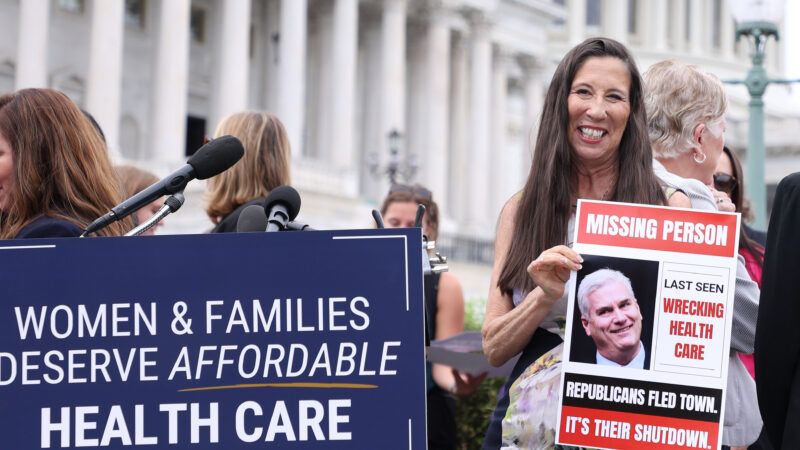Government Shutdowns Are an Example of Congress Doing Its Job
Refusing to fund the government is the primary way minority party lawmakers can check the excesses of the executive branch and the majority party.

When the government shut down for a few weeks in October 2013, then-President Barack Obama made sure to blame conservative Republicans for refusing to pass any short-term spending bill that included Obamacare insurance subsidies.
"The only thing preventing people from going back to work and basic research starting back up, and farmers and small business owners getting their loan…is that Speaker John Boehner won't even let the bill get a yes-or-no vote, because he doesn't want to anger the extremists in his party," said Obama in a mid-shutdown speech.
Today, it's Democrats who are refusing to vote for short-term funding bills to reopen the government so long as they don't include an extension of enhanced Obamacare insurance subsidies that are set to expire at the end of 2025.
Now, President Donald Trump's White House is accusing radical Democrats of inflicting misery and dysfunction on the country.
The shutdown instigated by "Radical Left lunatics" will cause "critical food assistance for low‑income women, infants, and children [to] lapse. Americans will experience travel delays and disruptions to Social Security services," reads a White House email sent out this afternoon.
The consistent rhetoric around government shutdowns, even if the parties and issues are reversed, betrays a common view of Congress' role in our constitutional design: Lawmakers should shut up and fund the government. When they don't do that, and the government shuts down, they've failed to do their job.
This view couldn't be more backwards about how our constitutional scheme, with its separate branches, divided powers, and limits on the power of the executive and majority parties, is supposed to work.
The whole reason for Congress having the power of the purse and holding regular votes on how much money to give the president to spend is to give it the opportunity to say no sometimes.
Congress exercising its power to say no to funding requests and shutting down the government is an example of it doing its job, not an example of it failing to do its job.
There's obviously a functional purpose served by Congress periodically voting on government spending. This creates regular opportunities for lawmakers to evaluate the performance of programs and propose to reform, expand, or abolish them.
More importantly, there's a political and constitutional purpose served by regular appropriations votes. It gives the Congress leverage to discipline an executive branch that might be behaving lawlessly or abusing the constitutional rights of Americans.
The Senate's filibuster likewise gives the minority party the ability to check the power of the majority party in Congress from rubber stamping executive abuses when they control both Congress and the White House.
Not a day goes by that a leading Democrat does not accuse Trump of acting in a lawless and authoritarian manner, whether because of Immigration and Customs Enforcement raids, National Guard deployments, intimidation of broadcast media companies, or more.
There's a lot of merit to Democrats' complaints on those fronts. If they take their own rhetoric seriously, they should be refusing to fund the government, absent some credible concessions from the White House.
Doing otherwise would be at best a tacit admission that they don't believe their own rhetoric. At worst, it would be a dereliction of duty.
To be sure, not every government shutdown is initiated for wise or worthwhile reasons.
Democratic demands in the run-up to this shutdown were notably not about the Trump administration backing off its most authoritarian initiatives. Instead, they're about demanding that "temporary" health insurance subsidies be automatically extended.
The relatively low stakes of that ask, and the fact that a lot of Republicans are eager to extend those subsidies as well, means that this government shutdown will likely be a short one. Because it's not aimed at the most destructive Trump administration policies, it'll be a relatively unproductive shutdown as well.
Still, the fact that the shutdown occurred at all is an increasingly rare example of Congress managing to fulfill its constitutional role of checking the executive. It's not an example of it failing to do its job.
Rent Free is a weekly newsletter from Christian Britschgi on urbanism and the fight for less regulation, more housing, more property rights, and more freedom in America's cities.


Show Comments (31)